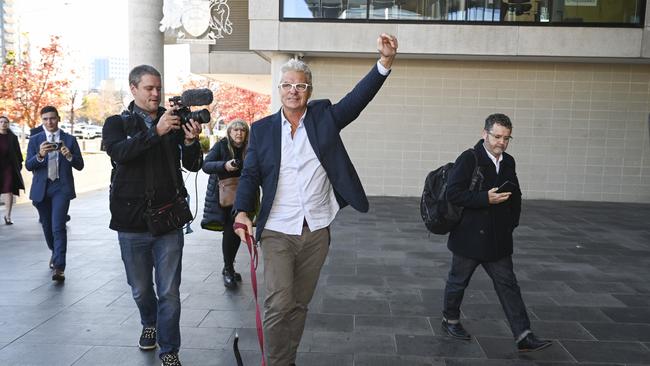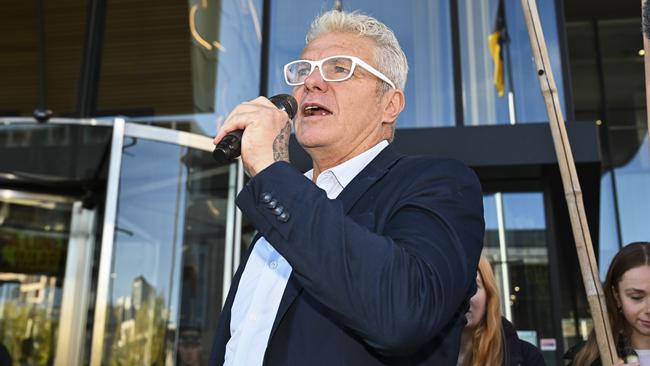Convicted whistleblower David McBride given leave to appeal sentence and conviction
A former military lawyer turned whistleblower has been given leave to appeal his sentence and convictions after he was jailed for leaking military information.

Former military lawyer David McBride has been granted leave to appeal his convictions and jail sentence for stealing and leaking military information.
In May, the whistleblower was sentenced to a maximum of 68 months behind bars in the ACT Supreme Court after he pleaded guilty to two counts of disclosing military information and one count of stealing from the government.
The court was told he took 235 sensitive documents, including 207 which were marked as classified, and handed them to the Australian Broadcasting Corporation between 2014 and 2015.
On Wednesday, McBride was formally granted leave to appeal his convictions and sentence.
NewsWire understands the Commonwealth Director of Public Prosecutions did not object to the request for an appeal. The office has been approached for comment.
A directions hearing has been set for October 17 in the ACT Court of Appeal, and a full hearing is likely to happen in March.

Before sentencing, his lawyers had intended to argue that McBride had a duty to disclose the information because of his military oath.
However, the defence was disallowed when Justice David Mossop ruled the former army lawyer had no legal duty to defy orders that were against the public interest.
After Justice Mossop found McBride’s actions were not justified by public interest, McBride pleaded guilty to the charges against him.
Crown prosecutor Trish McDonald SC said McBride acted in “arrogance” when contacting ABC journalists, and the theft was an “egregious” breach of responsibility of his senior role.
The Human Rights Law Centre called McBride’s five-year and eight-month sentence a “dark day for truth and justice in Australia”.
“David leaked documents to the ABC, which led to the Afghan Files reporting – which showed credible evidence of war crimes committed by Australian forces in Afghanistan,” a law centre spokesperson said.

“It was public interest journalism at its finest. And yet … the first person imprisoned in relation to Australia’s war crimes was not a war criminal, but the whistleblower.”
McBride leaked classified documents on which a series ABC reports titled the Afghan Files were based.
The landmark Brereton inquiry later found evidence that Australian forces had unlawfully killed 39 Afghans during the war.
McBride took the documents to show Australian soldiers were being “unfairly” investigated, but what the ABC found was to the contrary.
McBride believed good soldiers were going through serious trauma, which combined with his poor mental health, led him to steal sensitive information.
His lawyers said he shared the information with “honourable” intentions and out of a sense of personal duty.

But the prosecution said he was motivated by “personal vindication”, and the way he gathered, stored and then leaked the documents endangered national security and foreign policy.
The federal government argued because the leaked documents were sensitive, some of which contained cabinet communications, McBride’s actions constituted “very serious offending.”
When legal rulings sunk his defence and McBride pleaded guilty, he knew he would go to prison.
“When I’m locked up sitting in a cold six-by-four-metre prison cell in Canberra, I will get strength from those who have supported my long fight to ensure the ADF protects Australia and not simply politicians,” McBride said in a statement ahead of sentencing.
Justice Mossop said McBride was of “good character” but he was obsessed with the correctness of his own opinions, and sharing military secrets was “a gross breach of trust” for which he showed no remorse.
The former lawyer suffered PTSD and was abusing drugs and alcohol when he began copying documents and smuggling them out of an Australian Army base near Canberra.
He filed an internal complaint first, then went to the police and the defence minister with what he perceived were the wrongdoings of others, before leaking to the media.
Those ABC reports detailed how soldiers were allegedly covering up the unlawful killings of unarmed men and children, including a six-year-old boy who was allegedly shot in his sleep in 2013.
Reporters Dan Oakes and Sam Clark worked on the Afghan Files; Oakes was awarded a Medal of the Order of Australia for his services to journalism this year.

